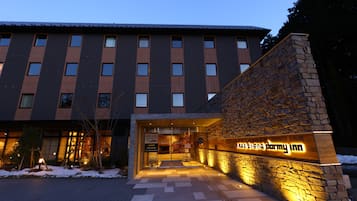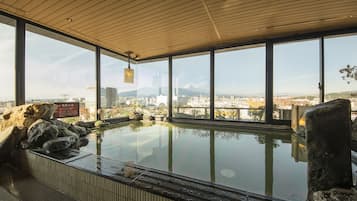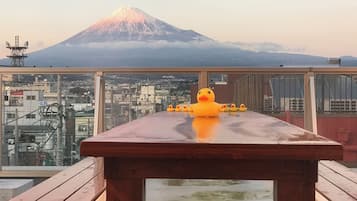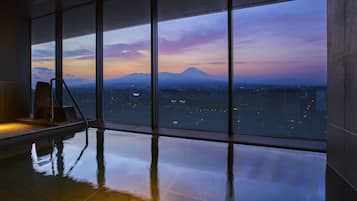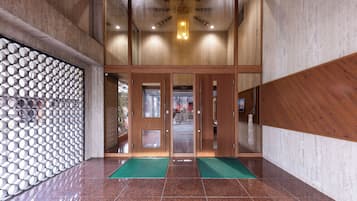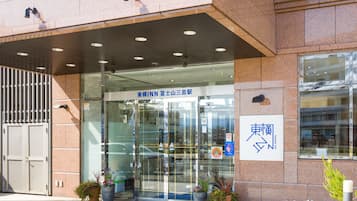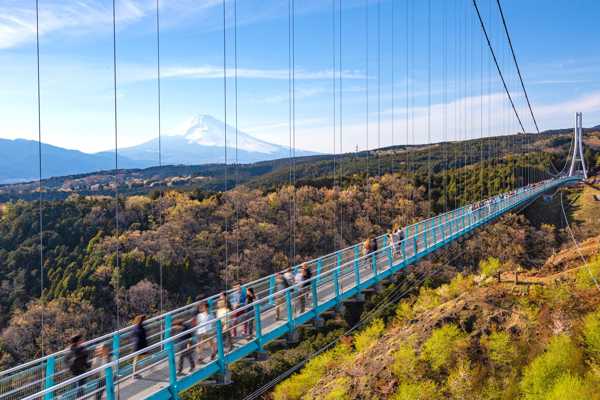Fujinomiya City is located in the eastern part of Shizuoka Prefecture that stretches westward from the summit of Mt. Fuji. Mt. Fuji itself is designated as a UNESCO World Heritage Site, but there are plenty of other natural and cultural attractions too, such as Mt. Fuji Hongu Sengen Taisha Shrine and Shiraito Falls.
The Asagiri Kogen plateau spreads out from the northern part of the city, and here you'll find thriving dairy farms and livestock farms and enjoy the taste of their fresh produce. The plateau is also a popular place to enjoy activities such as paragliding. Fujinomiya yakisoba (fried noodles) is also a famous attraction in its own right. With the majestic Mt.Fuji visible from all sides, Fujinomiya is the perfect place to spend a perfect day.
- 1
Michinoeki Asagiri Highland
Stop off at this service area for an ice cream and views of Mt. Fuji

- Couples
- Families
- Photo
Michinoeki Asagiri Highland is a service area designed in the style of a cattle barn, commanding a majestic view of Mt. Fuji. You’ll find it on Route 139, which used to be the Shio no Michi (Salt Road) connecting Shizuoka and Yamanashi.
It's a great place to take a drive and an even better spot to take a break. What more could you ask for than a cold ice cream on a warm day with stunning views of Mt. Fuji? Asagiri Highland itself is at the western foot of Mt. Fuji, at altitudes between 800 and 1,000 metres above sea level, and it’s full of livestock and dairy industries. The air is lovely and pure, so you can see Mt. Fuji from almost anywhere. Asagiri Highland is also a hugely popular place for various outdoor sports and activities such as paragliding and horse-riding.
Location: 492-14 Hozan, Nebara, Fujinomiya City, Shizuoka Prefecture 418-0101, Japan
Open: Shops: Daily from 8 am to 5 pm, Restaurants: Daily from 9 am to 5 pm
Phone: +81 (0)544-52-2230
Mapphoto by Alpsdake (CC BY-SA 4.0) modified
- 2
Shiraito Falls
A breathtaking sight with hundreds of waterfalls flowing from the middle of a cliff

- Couples
- Families
- Photo
Shiraito Falls is renowned as one of the most beautiful waterfall sites in Japan. True to its name, which means “white thread”, there are hundreds of waterfalls of all sizes rushing down from its curved cliff, which is 20 metres high and 150 metres wide, just like threads of silk.
Stand near the basin and you can step into a magical world created with the arches of water flowing in 3 directions. The reason why the water springs out from the middle of the cliff is that melted snow water flows out from the gap between two layers: the Shiraito lava flow, which allows water to pass easily, and the old Mt. Fuji mud flow, which makes it difficult for water to pass through. If you climb up to the observation platform, you can clearly see the water flowing out from the cliff. If the weather’s good, you can even see Mt. Fuji beyond the waterfalls.
Location: 273-1 Kamiide, Fujinomiya City, Shizuoka Prefecture 418-0103, Japan
Phone: +81 (0)544-22-1155
Map - 3
Fujisan Hongu Sengen Taisha Shrine
A vast shrine with Mt. Fuji as its deity and an inner shrine at the summit

- Couples
- Families
- History
- Photo
Fujisan Hongu Sengen Taisha Shrine is located at the southern foot of Mt. Fuji. It’s the head shrine of more than 1,300 Asama shrines, also called Sengen shrines, in the country, the centre of Mt. Fuji worship, and the Ichinomiya (the highest ranking shrine) of the former Suruga Province.
The shintai (object of worship) of the shrine is Mt. Fuji, and the entire top of Mt. Fuji from the 8th stage upwards is considered to be part of the shrine grounds, with its okumiya (interior shrine) at the summit. In the middle of its precincts of about 17,000 square metres is the main shrine built by Tokugawa Ieyasu in 1604, which has been designated as a Nationally Important Cultural Property. This is also a famous cherry blossom viewing spot with about 500 cherry trees associated with Konohanasakuya-hime, the deity of the shrine, planted as sacred trees.
Location: 1-1 Miyacho, Fujinomiya City, Shizuoka Prefecture 418-0067, Japan
Open: November—February: Daily from 6 am to 7 pm, March—October: Daily from 5.30 am to 7.30 pm, April—September: Daily from 5 am to 8 pm
Phone: +81 (0)544-27-2002
Map - 4
Mt. Fuji World Heritage Centre, Shizuoka
A fascinating museum where you can learn more about Mt. Fuji

- Families
- History
- Photo
Mt. Fuji World Heritage Centre, Shizuoka aims to preserve the value of Mt. Fuji as a World Cultural Heritage Site, and pass it down to future generations. You can learn an awful lot about Mt. Fuji here.
As well as permanent exhibitions adopting 6 themes, special exhibitions are also held each season. The exhibition facility features a 193-metre-long spiral slope. With time-lapse videos of the Fuji landscape displayed on the wall, you can enjoy a virtual experience of climbing this grand mountain as you work your way up the slope. After climbing the slope to the top, you’ll reach the observation hall, from which you can enjoy an unobstructed view of the real Mt. Fuji.
Location: 5-12 Miyacho, Fujinomiya City, Shizuoka Prefecture 418-0067, Japan
Open: Daily from 9 am to 5 pm (July—August until 6 pm)
Phone: +81 (0)544-21-3776
Mapphoto by Sablier de Verrie (CC BY-SA 4.0) modified
- 5
Fuji Kachoen Garden Park
A theme park with colourful flowers and adorable birds

- Families
- Photo
Located in Asagiri Highland, Fuji Kachoen Garden Park is an all-weather theme park brimming with flowers and birds.
Once you pass through the entrance, the first thing to catch your eye will be an impressive display of begonia flowers in the shape of Mt. Fuji. The garden park has a variety of plants on display, including big-bloomed eightfold begonias, the result of more than 20 years of cultivation and nurture, and more than 200 varieties of fuchsias, the gorgeous flowers of the Andes also known as queen's earrings. You’ll also be welcomed by more than 30 species of birds, including owls, horned owls, penguins, emus, and parakeets. There’s even a bird show where you can watch owls flying just above your head.
Location: 480-1 Nebara, Fujinomiya City, Shizuoka Prefecture 418-0101, Japan
Open: Daily from 9 am to 5 pm (December—March until 4 pm)
Phone: +81 (0)544-520880
Mapphoto by しんかわな (CC BY-SA 3.0) modified
- 6
Fujinokuni Tagonoura Minato Park
A scenic spot with panoramic views of Mt. Fuji and Suruga Bay

- Budget
- Families
- Photo
Fujinokuni Tagonoura Minato Park is located at the entrance to Tagonoura Port in Fuji City. It's a popular place for the locals to chill.
Check out the complete view of Mt. Fuji from sea level to the 3,776-metre-high summit on the north side, and Suruga Bay on the south side. The park has a playground for children, and you can enjoy a 360-degree panoramic view from the Mt. Fuji Dragon Tower. The night view of the city is pretty spectacular too. Head here about 30 minutes after sunset and you’ll see gorgeous views of factories, including paper mills in the Tagonoura Port district, and of Mt. Fuji itself.
Location: Chisaki, Maeda, Fuji City, Shizuoka Prefecture 416-0937, Japan
Open: Open all day, car park open daily from 8 am to 5 pm
Phone: +81 (0)545-33-0496
Map - 7
Wakutama Pond
A beautiful spring pond with a source of snow and rain from Mt. Fuji

- Budget
- Families
- Photo
Wakutama Pond is located next to the main hall of Fujisan Hongu Sengen Taisha, a shrine dedicated to Mt. Fuji. The crystal clear water of the pond is spring water from Mt. Fuji, which originally fell on the mountain and penetrated the ground many years ago.
It’s designated as a Special National Natural Treasure, and its water has been selected as one of the 100 Exquisite and Well-Conserved Waters of the Heisei Period. There’s a drinking fountain in front of the vermilion-lacquered Mizuya Shrine at the source, where you can taste fresh water directly from the spring. In ancient times, this spot was considered a place of purification for the worship of Mt. Fuji, and people purifying their bodies and minds in the holy water before heading to Mt. Fuji are depicted in Fuji Mandala paintings that show pilgrims' activities. Its scenic beauty was also mentioned in waka (Japanese poetry) by many poets.
Location: 1-1 Miyacho, Fujinomiya City, Shizuoka Prefecture 418-0067, Japan
Open: November—February: Daily from 6 am to 7 pm, March—October: Daily from 5.30 am to 7.30 pm, April—September: Daily from 5 am to 8 pm
Phone: +81 (0)544-27-2002
Mapphoto by Sablier de Verrie (CC BY-SA 4.0) modified
- 8
Lake Tanuki
Catch a glimpse of a sun-topped Mt. Fuji reflected in this beautiful lake

- Budget
- Couples
- Families
- Photo
Lake Tanuki is located in one corner of the vast Asagiri Highland. Due east of the lake, you can get a complete view of Mt. Fuji, and on a calm day you’ll be able to see Mt. Fuji reflected in the surface of the lake.
The lake is 1 km from east to west, and 0.5 km from north to south, having a circumference of 3.3 km. Take a lakeside walk and you can enjoy the beauty of nature, from cherry blossoms and azaleas in spring to golden leaves in autumn, which makes this area a perfect place for camping, boating, and hiking. It's also famous among fishing enthusiasts herabuna (Japanese crucian carp) fishing. For about a week either side of 20th April and 20th August, you can see a phenomenon called Diamond Fuji, when the rising sun aligns with the summit of Mt. Fuji, making the peak shine brilliantly like a diamond.
Location: Inokashira, Fujinomiya City, Shizuoka Prefecture 418-0108, Japan
Map - 9
Wakajishi-jinja Shrine
A shrine to the boy soldiers who trained here and died on the battlefield
- History
Wakajishi-jinja Shrine lies at the foot of Mt. Fuji. During World War II, this area was home to the Imperial Japanese Army Youth Tank School, where young men aged 14 to 19 received 2 years’ training.
A total of more than 4,000 boys learned in the exercise area that includes the Asagiri Highland. This shrine was built in 1984 to enshrine more than 600 instructors and students who died on the battlefield. Young tank soldiers were nicknamed Wakajishi (young lions). In the precincts, a Type 97 Chi-Ha medium tank discovered in Saipan in 1976 is enshrined. This is an ideal place to stop and think about the history of this now peaceful land.
Location: 2317-1 Kamiide, Fujinomiya City, Shizuoka Prefecture 418-0103, Japan
Open: 24/7
Phone: +81 (0)544-54-0210
Map




